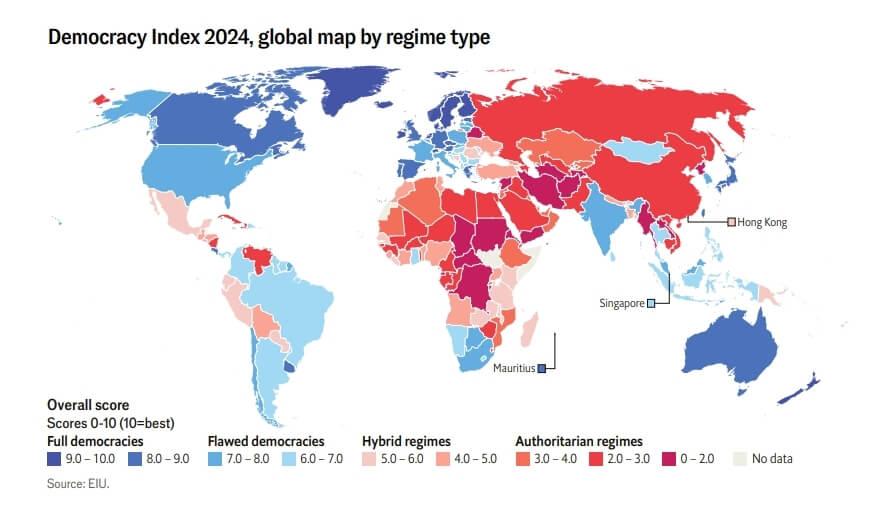Taiwan remained at the top of Asia and 12th globally among 167 countries and territories in the Democracy Index 2024, which was released today by the London-based Economist Intelligence Unit (EIU).
However, Taiwan’s score of 8.78 out of 10 was slightly lower than the 8.92 it received in 2023 when the country ranked 10th.
The index ranks countries and territories based on 60 indicators in five categories: electoral process and pluralism, functioning of government, political participation, political culture and civil liberties.

Photo: Screen grab from the Economist Intelligence Unit’s website
Based on the indicators, each area is given an overall score from zero to 10, and is classified as either a “full democracy,” “flawed democracy,” “hybrid regime” or “authoritarian regime.”
Taiwan is classified as a “full democracy,” scoring 10 out of 10 in electoral process and pluralism, 8.57 in functioning of government, 7.78 in political participation, 8.13 in political culture and 9.41 in civil liberties.
In comparison, China ranked 145th and is classified as an “authoritarian regime,” with a score of 2.11.
The world saw another democratic decline, with the average score falling to 5.17, the lowest since the index began in 2006, down from 5.23 in 2023, despite last year being a record election year when more than half of the global population went to the polls, the report said.
Only 45% of the world’s population lives in a democracy, 39% under authoritarian rule and 15% in “hybrid regimes” that combine electoral democracy with authoritarian tendencies, it said.
Norway retains its top ranking for the 16th consecutive year with a score of 9.81, followed by New Zealand and Sweden, while Afghanistan has been the least democratic country since 2021.
The EIU is an economics consultancy associated with The Economist magazine that provides forecasting and advisory services.

The Ministry of Education (MOE) is to launch a new program to encourage international students to stay in Taiwan and explore job opportunities here after graduation, Deputy Minister of Education Yeh Ping-cheng (葉丙成) said on Friday. The government would provide full scholarships for international students to further their studies for two years in Taiwan, so those who want to pursue a master’s degree can consider applying for the program, he said. The fields included are science, technology, engineering, mathematics, semiconductors and finance, Yeh added. The program, called “Intense 2+2,” would also assist international students who completed the two years of further studies in

Former president Tsai Ing-wen (蔡英文) departed for Europe on Friday night, with planned stops in Lithuania and Denmark. Tsai arrived at Taiwan Taoyuan International Airport on Friday night, but did not speak to reporters before departing. Tsai wrote on social media later that the purpose of the trip was to reaffirm the commitment of Taiwanese to working with democratic allies to promote regional security and stability, upholding freedom and democracy, and defending their homeland. She also expressed hope that through joint efforts, Taiwan and Europe would continue to be partners building up economic resilience on the global stage. The former president was to first

Taiwan will now have four additional national holidays after the Legislative Yuan passed an amendment today, which also made Labor Day a national holiday for all sectors. The Chinese Nationalist Party (KMT) and Taiwan People’s Party (TPP) used their majority in the Legislative Yuan to pass the amendment to the Act on Implementing Memorial Days and State Holidays (紀念日及節日實施辦法), which the parties jointly proposed, in its third and final reading today. The legislature passed the bill to amend the act, which is currently enforced administratively, raising it to the legal level. The new legislation recognizes Confucius’ birthday on Sept. 28, the

MORE NEEDED: Recall drives against legislators in Miaoli’s two districts and Hsinchu’s second district were still a few thousand signatures short of the second-stage threshold Campaigners aiming to recall Chinese Nationalist Party (KMT) legislators yesterday said they expect success in 30 out of 35 districts where drives have passed the second-stage threshold, which would mark a record number of recall votes held at once. Hsinchu County recall campaigners yesterday announced that they reached the second-stage threshold in the recall effort against Legislator Lin Szu-ming (林思銘). A total of 26,414 signatures have been gathered over the past two months, surpassing the 10 percent threshold of 23,287 in Hsinchu County’s second electoral district, chief campaigner Hsieh Ting-ting (謝婷婷) said. “Our target is to gather an additional 1,500 signatures to reach